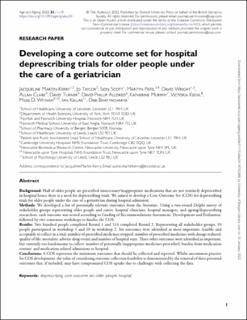| dc.contributor.author | Martin-Kerry, Jacqueline | |
| dc.contributor.author | Taylor, Jo | |
| dc.contributor.author | Scott, Sion | |
| dc.contributor.author | Patel, Martyn | |
| dc.contributor.author | Wright, David John | |
| dc.contributor.author | Clark, Allan | |
| dc.contributor.author | Turner, David | |
| dc.contributor.author | Alldred, David Phillip | |
| dc.contributor.author | Murphy, Katherine | |
| dc.contributor.author | Keevil, Victoria | |
| dc.contributor.author | Witham, Miles D. | |
| dc.contributor.author | Kellar, Ian | |
| dc.contributor.author | Bhattacharya, Debi | |
| dc.date.accessioned | 2023-01-19T08:37:11Z | |
| dc.date.available | 2023-01-19T08:37:11Z | |
| dc.date.created | 2022-11-27T13:35:49Z | |
| dc.date.issued | 2022 | |
| dc.identifier.issn | 0002-0729 | |
| dc.identifier.uri | https://hdl.handle.net/11250/3044463 | |
| dc.description.abstract | Background
Half of older people are prescribed unnecessary/inappropriate medications that are not routinely deprescribed in hospital hence there is a need for deprescribing trials. We aimed to develop a Core Outcome Set (COS) for deprescribing trials for older people under the care of a geriatrician during hospital admission.
Methods
We developed a list of potentially relevant outcomes from the literature. Using a two-round Delphi survey of stakeholder groups representing older people and carers, hospital clinicians, hospital managers, and ageing/deprescribing researchers, each outcome was scored according to Grading of Recommendations Assessment, Development and Evaluation, followed by two consensus workshops to finalise the COS.
Results
Two hundred people completed Round 1 and 114 completed Round 2. Representing all stakeholder groups, 10 people participated in workshop 1 and 10 in workshop 2. Six outcomes were identified as most important, feasible and acceptable to collect in a trial: number of prescribed medicines stopped; number of prescribed medicines with dosage reduced; quality of life; mortality; adverse drug events and number of hospital stays. Three other outcomes were identified as important, but currently too burdensome to collect: number of potentially inappropriate medicines prescribed; burden from medication routine; and medication-related admissions to hospital.
Conclusions
A COS represents the minimum outcomes that should be collected and reported. Whilst uncommon practice for COS development, the value of considering outcome collection feasibility is demonstrated by the removal of three potential outcomes that, if included, may have compromised COS uptake due to challenges with collecting the data. | en_US |
| dc.language.iso | eng | en_US |
| dc.publisher | Oxford University Press | en_US |
| dc.rights | Navngivelse-Ikkekommersiell 4.0 Internasjonal | * |
| dc.rights.uri | http://creativecommons.org/licenses/by-nc/4.0/deed.no | * |
| dc.title | Developing a core outcome set for hospital deprescribing trials for older people under the care of a geriatrician | en_US |
| dc.type | Journal article | en_US |
| dc.type | Peer reviewed | en_US |
| dc.description.version | publishedVersion | en_US |
| dc.rights.holder | Copyright 2022 The Author(s) | en_US |
| dc.source.articlenumber | afac241 | en_US |
| cristin.ispublished | true | |
| cristin.fulltext | original | |
| cristin.qualitycode | 2 | |
| dc.identifier.doi | 10.1093/ageing/afac241 | |
| dc.identifier.cristin | 2081770 | |
| dc.source.journal | Age and Ageing | en_US |
| dc.identifier.citation | Age and Ageing. 2022, 51 (11), afac241. | en_US |
| dc.source.volume | 51 | en_US |
| dc.source.issue | 11 | en_US |

